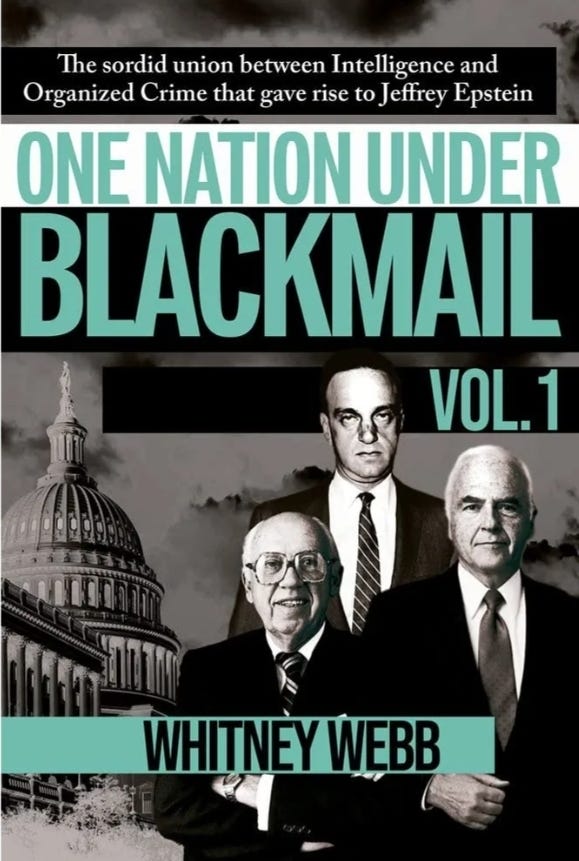One Nation Under Blackmail – Vol. 1
One Nation Under Blackmail – Vol. 1 by investigative journalist Whitney Webb explores the deep-rooted connections between intelligence agencies
One Nation Under Blackmail – Vol. 1 by investigative journalist Whitney Webb explores the deep-rooted connections between intelligence agencies, organized crime, and political elites, ultimately leading to the rise of Jeffrey Epstein. In this first volume of her two-part series, Webb provides an exhaustive historical account of how intelligence operations have frequently overlapped with organized crime, laying the groundwork for the criminal network that Epstein became infamous for.
Webb investigates the broader infrastructure behind Epstein’s operations, tracing how financial, political, and sexual blackmail have been used as tools by intelligence agencies to gain control over powerful individuals. This volume covers the origins of these covert practices, showing how intelligence agencies, particularly the CIA and Israeli Mossad, developed long-standing relationships with criminal syndicates to further their geopolitical and economic interests.
Key Themes:
The Origins of Intelligence-Crime Collusion: Webb begins by detailing the history of cooperation between intelligence agencies and organized crime syndicates. She traces this back to World War II, highlighting early collaborations between U.S. intelligence (such as the OSS, which later became the CIA) and mafia organizations. These partnerships, originally forged for specific wartime goals, evolved into more complex relationships that lasted throughout the Cold War and beyond.
Operation Underworld and the Birth of Covert Power Structures: A significant part of the book focuses on Operation Underworld, a collaboration between the U.S. Navy and mafia figures during World War II, primarily to protect American ports from Axis sabotage. Webb suggests that this operation marked the beginning of a partnership that blurred the lines between law enforcement, intelligence, and criminal activities, a trend that continued through the 20th century.
Cold War Blackmail Operations: Webb emphasizes the role of blackmail—especially sexual blackmail—as a tool used by intelligence agencies to control political leaders, businessmen, and other influential figures. She explains how sexual exploitation became a tactic of choice during the Cold War to entrap individuals into serving intelligence agendas. This tactic would later be employed in the Epstein case, which Webb frames as a continuation of this dark strategy.
The Role of Organized Crime in Intelligence Operations: The book explores how organized crime figures—such as Meyer Lansky and his mafia network—became key allies of U.S. intelligence agencies, particularly in efforts to combat communism. Webb argues that these relationships helped solidify a criminal-political nexus, allowing figures like Jeffrey Epstein to flourish in an environment where illicit activities and intelligence goals intersected.
Rise of Financial Corruption and Elite Control: Webb also traces how financial crimes and corruption became intertwined with intelligence operations. She discusses how Wall Street financiers, often connected to organized crime or intelligence agencies, were involved in covert operations that protected elite interests. Epstein’s involvement in high-level financial schemes is framed within this context of entrenched elite criminality.
Sexual Blackmail Networks and Epstein’s Role: The latter part of the book begins to focus on the rise of Jeffrey Epstein himself, portraying him as a key figure in a long-running tradition of using sexual blackmail to gain leverage over powerful individuals. Webb provides background on how Epstein’s financial, political, and social connections allowed him to operate with impunity, protected by the same networks of intelligence and crime explored throughout the book.
The Role of U.S. and Israeli Intelligence: Webb emphasizes the roles of both U.S. and Israeli intelligence agencies, particularly the CIA and Mossad, in enabling and possibly supporting Epstein’s activities. She suggests that Epstein’s connections with intelligence agencies were part of a broader strategy of using individuals like him to gather compromising material (such as through sexual entrapment) to control politicians and other influential figures.
Key Takeaways:
Long-Standing Collaboration Between Intelligence and Organized Crime: Webb argues that the Epstein case is not an isolated event but the culmination of decades of collaboration between intelligence agencies and organized crime syndicates, with blackmail being a core strategy of control.
Blackmail as a Tool of Power: Sexual blackmail, as exemplified by Epstein’s operations, has been a consistent method for intelligence agencies to control influential figures, especially in politics and finance. Epstein’s involvement in these networks is framed as part of a larger strategy that dates back to the Cold War.
Intelligence and Financial Crimes: Epstein’s financial dealings are presented as part of a broader trend in which intelligence agencies collaborate with financiers and criminals to manipulate global economic and political systems for their advantage.
Protection of Elite Networks: The book suggests that elite networks, aided by intelligence agencies, have protected individuals like Epstein from legal consequences because they are too valuable as tools of leverage and control.
Reception and Criticism:
One Nation Under Blackmail – Vol. 1 has been well-received by readers interested in deep investigative journalism and conspiracy theories surrounding power structures. Webb’s meticulous research is praised for bringing to light the historical context that frames the Epstein scandal within a broader system of elite corruption and intelligence manipulation.
Importance:
Webb’s One Nation Under Blackmail offers a detailed investigation into the dark underpinnings of global power structures, challenging readers to reconsider the official narrative surrounding Epstein and elite corruption. For those interested in the intersection of organized crime, intelligence operations, and elite control, the book provides a comprehensive analysis of how these forces have shaped world events and the rise of figures like Epstein.
Conclusion:
One Nation Under Blackmail – Vol. 1 lays the foundation for understanding how the Jeffrey Epstein scandal is part of a much larger history of corruption and covert power struggles. By investigating the long-standing relationships between intelligence agencies, organized crime, and elite interests, Whitney Webb’s book offers an alternative and provocative view of how illicit activities and blackmail have been used as tools of control. While controversial and speculative in some parts, the book is an ambitious and thorough examination of the darker side of intelligence and organized crime in the modern world.
Happy Holidays from the Art of Liberty Foundation!
Celebrate the season with special discounts:
20% off from December 5th-8th with the code Liberty20
15% off from December 9th-12th with the code Liberty15
10% off from December 13th until Christmas with the code Liberty10
Shop for unique books and gifts now at Government-Scam.com/store and make this holiday season extra special!







I was just thinking of how we had to say the pledge of allegiance in school every day. I believed it and meant it. Clearly most did not. Now I won’t. I was thinking of making up a new pledge for my school that I probably won’t start someday. … but it’ll have to include ‘one nation under blackmail’ lol… I wish I had that kind of wit to come up with titles like that.